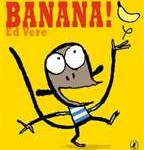 Want a book that every kid in your class can read with expression and enjoyment? Try Ed Vere’s nearly wordless picture book, Banana! I love using wordless and nearly wordless books with young readers. (If you want the myriad of reasons why wordless books are great for building narrative skills, fluency, top-down processing, etc., check out this article by the Center for the Improvement of Early Reading Achievement or this one from Education Week.) The facial expressions on the two monkeys are so engaging, and the text is limited to two words: banana and please with either question marks or exclamation points. Read it aloud once to your little ones, and they’ll be begging to read it on their own. Use it as a lesson on punctuation and how it changes the way we read words on the page. Take two monkey puppets or make monkey masks and let the kids act out the story – even better if you bring in real bananas!
Want a book that every kid in your class can read with expression and enjoyment? Try Ed Vere’s nearly wordless picture book, Banana! I love using wordless and nearly wordless books with young readers. (If you want the myriad of reasons why wordless books are great for building narrative skills, fluency, top-down processing, etc., check out this article by the Center for the Improvement of Early Reading Achievement or this one from Education Week.) The facial expressions on the two monkeys are so engaging, and the text is limited to two words: banana and please with either question marks or exclamation points. Read it aloud once to your little ones, and they’ll be begging to read it on their own. Use it as a lesson on punctuation and how it changes the way we read words on the page. Take two monkey puppets or make monkey masks and let the kids act out the story – even better if you bring in real bananas!
A reader made a comment on the book cover, so I’m including my response to her in the comments here for others to read and to chime in!
Hi, Jackie!
“Banana!” is perfect for young readers’ theater. After reading the book to your students, split them into pairs. The kids can make their own monkey masks or hats or puppets, and let them practice their lines. Then, they get to take turns performing for the class, reading their lines as you hold up the book and turn the pages.
Point out how the exclamation mark and question mark change the way we read the words. You can make a silly spin-off book called “Apple!” Take photos of two teachers arguing over who gets to eat the apple and lay them out like Ed Vere’s pages. You can make lots of little class books like this if you have a digital camera – let your students be the stars of the book, arguing over and eventually sharing an orange, or a pencil, etc.
I haven’t found many great, easy non-fiction books about bananas, but it’d be cool for students to see how bananas grow in bunches upside-down and find out facts about this fun fruit.
To work on comparing and contrasting skills, compare this easy read to Jez Alborough’s “Hug”, “Tall”, or “Yes”.
I hope these help!
Kristen